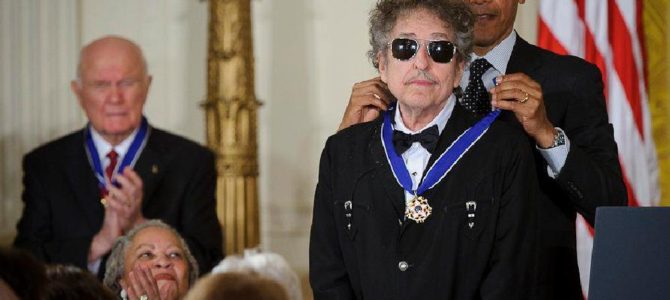Bob Dylan becoming the Nobel Laureate in literature for 2016 was the perfect combination for conservatives who dismiss Dylan’s talent or see the Nobel Prize as a diminishing measure of cultural worth. Dylan accepted the prize in April in a private ceremony, and now has delivered an audio version that the committee requires of Nobel laureates.
Dylan’s 27-minute lecture evokes the editorial voice from “Chronicles: Volume 1” (2005), the beginning of his discursive memoirs. Dylan grants from the beginning that his lecture likely will be roundabout, and he delivers on that quality. He speaks of influences from Buddy Holly and Leadbelly, but also of studying such classics of Western literature as “Don Quixote,” “Ivanhoe,” “Robinson Crusoe,” and “A Tale of Two Cities.” He calls these novels “typical grammar school reading.” It’s not clear whether this is Dylan’s famous embellishment of his backstory or a quiet nod to embattled works by dead white men.
Dylan makes a solid case that he indeed loves classic literature, absorbs its messages, and sends those messages back out again through his songwriting. He offers brisk summaries of “Moby-Dick,” “All Quiet on the Western Front,” and “The Odyssey.” He is accessible when confessing that “All Quiet on the Western Front” obliterated any interest he might have in reading another war novel.
Dylan’s lecture is unlikely to change the mind of anyone who was baffled by the Nobel Committee’s decision that he should join the list of laureates. Dylan is no William Faulkner or George Bernard Shaw, but he does not pretend otherwise. Dylan identifies that the Muse speaks through artists across time, in a wide range of voices, and the best artists welcome the chance to be such a vessel.
It is cheap sport to quote Dylan’s Dada lyrics from “Subterranean Homesick Blues” (1965), as though these marked the apex of his songwriting. Let the same critics write off the composer of “I Dreamed I Saw Saint Augustine” (1969), “Every Grain of Sand” (1981), or “Most of the Time” (2008) as a lucky hack who simply knew how to translate the zeitgeist for better placement on Billboard’s Top 100.
When the Nobel Committee’s decision was announced and Dylan did not respond for a time, John Podhoretz expressed a hope that perhaps Dylan would decline in protest of the committee’s Israel-bashing. I shared that fond hope. I wish, in fact, that Dylan’s lecture had consisted of his memories about Buddy Holly and Leadbelly, leading straight into live performances of the sort of songs that make him worthy of the prize: “Chimes of Freedom,” “Idiot Wind,” “Mozambique,” “Jokerman,” “Series of Dreams” — and “Neighborhood Bully,” the very best (and possibly the only) rock ‘n roll song so defiantly pro-Israel.
After Dylan won an Oscar for his song “Things Have Changed,” used on the soundtrack of “Wonder Boys” (2001), he began parking the statue atop one of the amplifiers during his concerts. The next time I see Dylan, I would love to see the Nobel hanging from that Oscar.
But even without the Nobel hovering in the background, Dylan fans will know why we are there: Dylan touches something deep in our souls, not simply with his lyrics or his acoustic guitar or the harmonica solos that always make the crowds whoop. It will be there in his singing voice, ravaged as it is by a long career of touring and sometimes shouting his songs into the night. It will be a sound of pain, of loss, of regrets, but somehow too of abiding hope.









